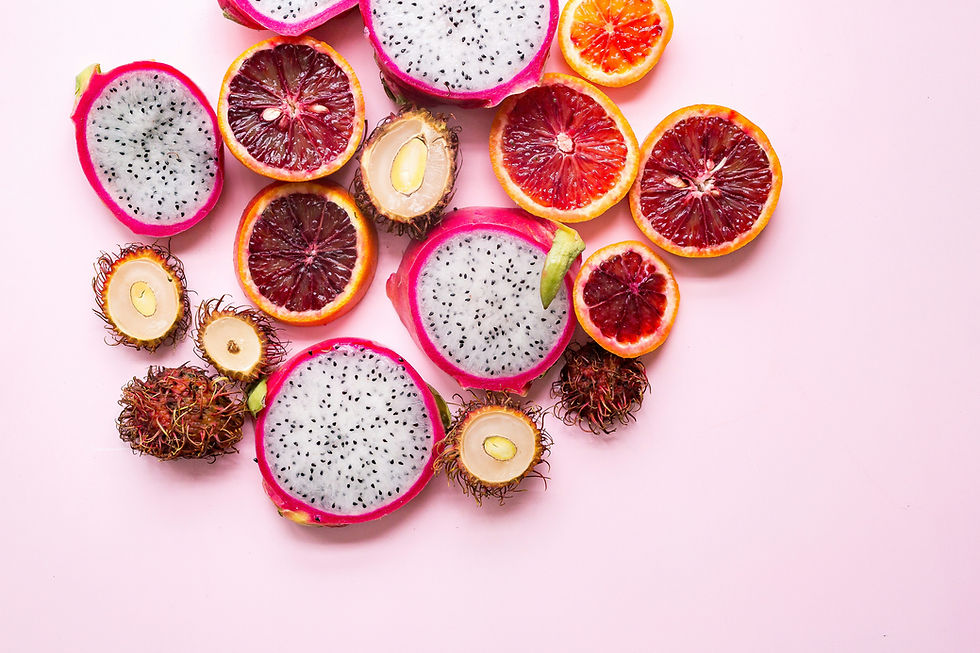Yoga and Nutrition: Foods to Fuel Your Practice
- Cassie Ward

- Jan 8, 2025
- 3 min read

Yoga is more than just movement—it's a holistic lifestyle that emphasizes harmony between mind, body, and spirit. While your time on the mat strengthens and balances your body, the food you eat plays an equally important role in fueling your practice. Proper nutrition not only energizes your body but also supports mental clarity and overall well-being, enhancing your yoga journey.
At Anahata, we believe in nurturing your practice from the inside out. Here’s a guide to understanding how nutrition complements your yoga routine and which foods are best for fueling your body.
The Connection Between Yoga and Nutrition
Yoga emphasizes mindfulness, which extends to how we nourish ourselves. Eating with awareness helps us choose foods that provide energy, enhance focus, and support recovery. Just as yoga is about balance, so is the food we eat. A balanced diet can:
Provide sustained energy for physical movement.
Support muscle recovery after practice.
Promote mental clarity and relaxation.
Nourish the body with essential vitamins and minerals.
Foods to Fuel Your Yoga Practice
Here are some nutrient-rich foods to incorporate into your diet to energize your practice and support recovery:
1. Fresh Fruits and Vegetables
Why They Help: Packed with vitamins, minerals, and antioxidants, fruits and vegetables are essential for energy and overall health. Their natural sugars provide a quick energy boost, while fiber aids digestion.
Examples: Bananas, berries, leafy greens, carrots, and avocados.
2. Whole Grains
Why They Help: Whole grains provide complex carbohydrates that release energy slowly, keeping you fueled throughout your practice.
Examples: Brown rice, quinoa, oats, and whole-grain bread.
3. Healthy Fats
Why They Help: Fats are a crucial energy source and help keep you feeling satisfied. They also support brain health, which is key for mindfulness.
Examples: Nuts, seeds, olive oil, and coconut.
4. Lean Proteins
Why They Help: Protein is vital for muscle recovery and repair after a challenging yoga session.
Examples: Chickpeas, lentils, tofu, eggs, and Greek yogurt.
5. Hydrating Foods and Fluids
Why They Help: Staying hydrated is essential for maintaining energy levels and preventing muscle cramps. Hydrating foods and fluids replenish electrolytes lost during practice.
Examples: Water, herbal teas, coconut water, cucumbers, and watermelon.
Pre-Yoga Snacks
Eating the right foods before yoga ensures you have the energy to move without feeling weighed down. Aim for a light snack 1–2 hours before your session:
A banana with almond butter.
A handful of nuts and dried fruit.
A slice of whole-grain toast with avocado.
Greek yogurt with a drizzle of honey and a few berries.
Avoid heavy meals right before yoga, as they can make you feel sluggish or uncomfortable during practice.
Post-Yoga Nutrition
After yoga, focus on foods that replenish energy, hydrate the body, and support muscle recovery. Include a mix of protein, carbohydrates, and healthy fats:
A smoothie with spinach, banana, protein powder, and almond milk.
Quinoa salad with roasted vegetables and a drizzle of olive oil.
A bowl of oatmeal topped with nuts, seeds, and fresh fruit.
Hydration is also crucial after practice. Drink water or herbal tea to rehydrate and help your body recover.
Mindful Eating Tips for Yogis
Eat with Awareness: Just as yoga encourages mindfulness on the mat, practice mindfulness at meals by eating slowly and savoring each bite.
Listen to Your Body: Pay attention to hunger and fullness cues. Yoga helps you tune into your body’s needs.
Choose Whole, Natural Foods: Minimize processed foods and focus on nutrient-dense options that nourish your body.
Stay Hydrated: Drink water throughout the day, not just during or after practice.
Sample Daily Meal Plan for Yogis
Here’s a simple, balanced meal plan to support your yoga practice:
Breakfast: A smoothie bowl with spinach, frozen mango, chia seeds, and almond butter.
Snack: A handful of almonds and an apple.
Lunch: Buddha bowl with quinoa, roasted sweet potatoes, chickpeas, and tahini dressing.
Snack: Greek yogurt with a drizzle of honey and a sprinkle of granola.
Dinner: Grilled salmon (or tofu), sautéed greens, and brown rice.
Hydration: Herbal teas, coconut water, or infused water throughout the day.
Enhance Your Practice with Nourishing Foods
Yoga is a practice of balance, and the way you fuel your body plays a critical role in maintaining that balance. By incorporating nutrient-rich, mindful eating habits into your routine, you can enhance your energy, focus, and overall well-being—on and off the mat.
At Anahata, we encourage a holistic approach to wellness that combines movement, mindfulness, and nourishment. Ready to elevate your yoga practice with mindful nutrition? Join us and discover how the right foods can fuel your body and mind for a vibrant, balanced life. ✨







Comments